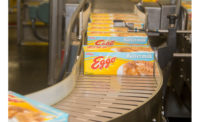Since Hormel Foods’ founding in 1891, corporate responsibility has been a significant part of its culture. Whether it’s treating its people, communities and
environment with respect and integrity or producing high-quality products in a sustainable and energy-efficient manner, the Austin, Minn.-based processor of refrigerated and frozen beef, turkey and pork makes corporate responsibility an everyday business practice.
“Hormel Foods is steadfastly committed to making our processes increasingly sustainable, having transparency in sustainability reporting and minimizing our overall impact on the environment,” says Tom Raymond, director of environmental sustainability. “In order to promote environmental sustainability in our day-to-day operations in the corporate offices, plants and company-owned farms, we focus on reducing energy and water usage, solid waste production and greenhouse gas emissions.”
That’s why Refrigerated & Frozen Foods honors Hormel Foods with its third annual Sustainable Supply Chain of the Year award. (Hormel Foods also placed No. 4 and No. 5, respectively, in Refrigerated & Frozen Foods’ Top 150 Frozen Food Processors, March 2013 issue, and Top 25 Refrigerated Food Processors, January 2013 issue).
For years, Hormel Foods has had several programs in place to inspire a year-over-year carbon footprint reduction, and 2012 was no exception. In fact, Hormel Foods stayed the course by showcasing significant supply chain carbon reduction, optimizing its supply chain network, enhancing logistics and transportation models, showcasing vast efforts in revamping its packaging network and increasing “green” awareness through internal corporate sustainability programs.
Here’s a look at Hormel Foods’ year-over-year achievements.
Optimizing the overall supply chain network. The multifaceted supply chain at Hormel Foods includes suppliers for hogs, turkeys, ingredients, packaging materials, transportation and services, says Bill Snyder, senior vice president, supply chain.
“[Hormel Foods] recognizes the crucial role of the supply chain in its ability to operate responsibly,” he adds. “While it is a complex undertaking to understand and measure the impacts of supply chain, we have had formal Supplier Quality Management Systems in place since the late 1980s that ensure the quality and consistency of products and services.”
Hormel Foods also requires its suppliers to adhere to the “Hormel Foods Supplier Responsibility Principles,” which is a commitment to responsible, environmental and social performance, Snyder says.
“In partnership, Hormel Foods and its suppliers deliver quality products and add value to society,” he adds. “The company additionally requires its suppliers to act in accordance with all applicable federal, state and local laws and regulations.”
Going green. To recognize new thinking and encourage projects that drive resource efficiency, Hormel Foods established the Environmental Sustainability Best of the Best annual competition in 2008. This program is designed to recognize and reward Hormel Foods’ teams that have identified areas for improvement and implemented changes that make a measurable difference in reducing the company’s environmental impact.
Since its inception, the competition has grown.
For example, 34 projects were submitted in 2008 (the first year of the competition). By 2012, the competition generated 61 entries throughout all business segments that resulted in the reduction of more than 1,700 tons of solid waste to landfill, improving the corporate-wide recycle rate to 47% and saving more than 121 million gallons of water.
In July 2008, Hormel Foods broke ground on a new plant in Dubuque, Iowa. The $89 million project would be the first manufacturing facility the company built from the ground up in more than 25 years. A year-and-a-half later, on Jan. 25, 2010, the 348,000-square-foot Progressive Processing facility officially opened its doors and began production of Hormel Compleats microwavable meals. From details such as the reflective roof and parking surfaces to the premium-efficiency electric motors and intricate processes like the gray water recovery system, Progressive Processing was designed to be as efficient and environmentally-friendly as possible.
As a result of these factors, the facility was said to be one of the first manufacturing plants—and the only refrigerated food processing facility in the United States—to be LEED certified at any level.
Furthermore, Hormel Foods received LEED Gold certification for the Corporate Office North addition to its Austin, Minn., headquarters. Some of the sustainable features of the 28,000-square-foot addition include a geoexchange heating and cooling system; lighting controls that monitor needs based on daylight, occupancy and time schedule; reflective roofing materials that reduce heat load from solar radiation; a gray water system that utilizes rain and groundwater; and recycling collection areas.
Logistics. “We are continually looking for ways to improve our efficiencies,” Snyder adds. “For example, our Austin, Minn., plant team implemented an innovative project to switch to using ultra lightweight trucks to be able to haul more products per load. Using lightweight equipment is not only more efficient, it also saves money, preserves natural resources and reduces greenhouse gases.”
By shipping more weight per loaded trailer on each lightweight truck, Hormel Foods was able to calculate that it reduced the miles driven in 2012 by more than 54,000. This resulted in saving more than 9,800 gallons of fuel, which equates to a reduction of almost 100 metric tons of CO2-e.
And, because Hormel Foods sells products worldwide, it relies on transportation via truck, train and ship to deliver products to customers, Raymond says.
“To minimize our impact on air quality, the company transports products as efficiently as possible by structuring pallet loads, reviewing product mixes and improving route planning,” Raymond says.
That’s why Hormel Foods continues to use intermodal shipments, which combine the best attributes of both truck and rail shipping. For long distances, this method of transportation can cut fuel use and greenhouse gas emissions by 65% compared to truck-only moves, Raymond adds. For instance, in fiscal year 2011, the company had 8,000 intermodal shipments. These shipments accounted for 10.5 million miles and saved more than 1.1 million gallons of diesel fuel vs. shipping solely by truck.
Warehouse improvements. “Internal warehouse sustainability efforts are usually in one of two categories—lighting improvements and dock door seal inspection, repair and (if needed) replacement,” Raymond says.
For example, in 2011, Hormel Foods’ Dayton, Ohio, distribution center completed a lighting retrofit, resulting in an energy improvement of 992,700 kWh.
Packaging reduction. A key example of the company’s commitment to sustainability lies within its packaging reduction efforts. That’s because a dedicated group of employees continuously focuses on design and looks for minimization opportunities.
In 2011, this team initiated more than 58 total projects and completed 33 of them. Combined, these projects resulted in 4.29 million pounds in savings.
An example of one highly innovative and successful project is a package conversion for the company’s Lloyd’s barbeque products.
“Lloyd’s Barbeque Co. had a line of shredded meats that were packaged in a plastic tub, lid and paper sleeve, which was very common, causing the ‘heat-and-eat’ set to become crowded with competition,” says Dan Miller, group manager, packaging and applied research. “To address this, the team worked cross-functionally to develop new sleeveless packaging, which is considered the gold standard for packaging in the refrigerated ‘heat-and-eat’ section.”
The new packaging change launched in the first quarter of 2012, and is estimated to eliminate the printing of 25 million packaging sleeves, and achieve an estimated annual reduction of 4.8 million gallons of wastewater; 1,315 metric tons of greenhouse gases; and 795,000 pounds of solid waste to landfills.
Sustainability awards, recognition. Refrigerated & Frozen Foods’ 2013 Sustainable Supply Chain of the Year award isn’t the only honor Hormel Foods has received for its cutting-edge ability to practice sustainability.
This past year, Jeffrey M. Ettinger, chairman of the board, president and CEO, was recognized as Responsible CEO of the Year by Corporate Responsibility magazine. The company was also named on the Newsweek Green Rankings list from 2009-2012, was included on the Maplecroft CII Benchmark Index in 2010 and 2012 (the list was not published in 2011) and was added to the Dow Jones Sustainability Index in 2010 and 2011.
In addition, Hormel Foods received two Environmental Achievement Awards in March from the American Meat Institute, Washington, D.C., in the categories of environmental technology, outreach and training programs and resource conservation.
Goals for the future. “We are relentless with our corporate responsibility efforts, and continually look for ways to improve our efficiencies,” says Raymond.
Last year, Hormel Foods announced its second set of environmental goals, which will span from 2012-2020 using 2011 as a benchmark. (The first set of environmental goals was completed in 2011, which commenced five years earlier).
The new goals include:
• Reduce product packaging by 25 million pounds by 2020.
• Reduce water use 10% by 2020.
• Reduce solid waste sent to landfill 10% by 2020.
• Reduce greenhouse gas emissions 10% by 2020.
• Reduce non-renewable energy use 10% by 2020.
“Our company’s approach to corporate responsibility is a true team effort,” says Raymond. “We have an interdepartmental group of ‘sustainability leaders’ that meets regularly to discuss overall corporate responsibility initiatives.”
Refrigerated & Frozen Foods’ editor-in-chief Marina Mayer will present the 2013 Sustainable Supply Chain of the Year award at the Food Logistics Forum, June 2-4 in Las Vegas. For more information on this event, turn to page 42 or go to www.affi.org.
Call for 2014 Nominations
It’s never too early to begin thinking about next year’s Sustainable Supply Chain winner(s). So, throw your hat in the ring now.
The Sustainable Supply Chain of the Year award recognizes a refrigerated or frozen food processor’s year-over-year efforts to reduce carbon footprint in transportation and warehousing activities, including front-end transportation savings, warehouse networks, transportation and packaging optimization, warehouse improvements and noteworthy supply chain efforts.
Do you or someone you know fit the bill? Look for the nomination form online at www.RFFmag.com or email editor-in-chief Marina Mayer at mayerm@bnpmedia.com.













